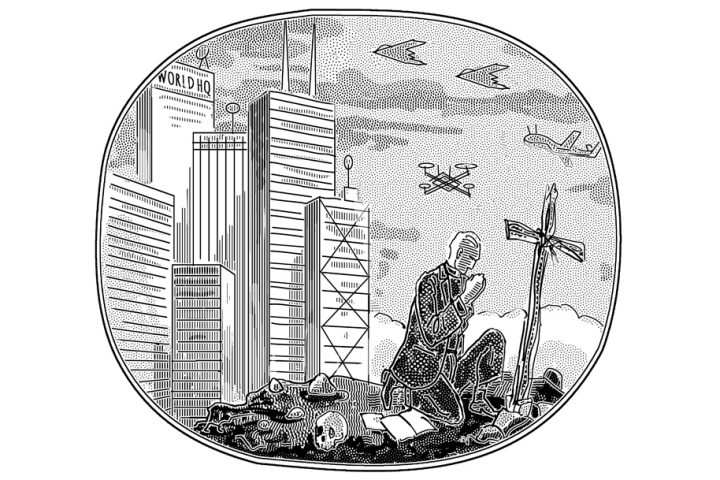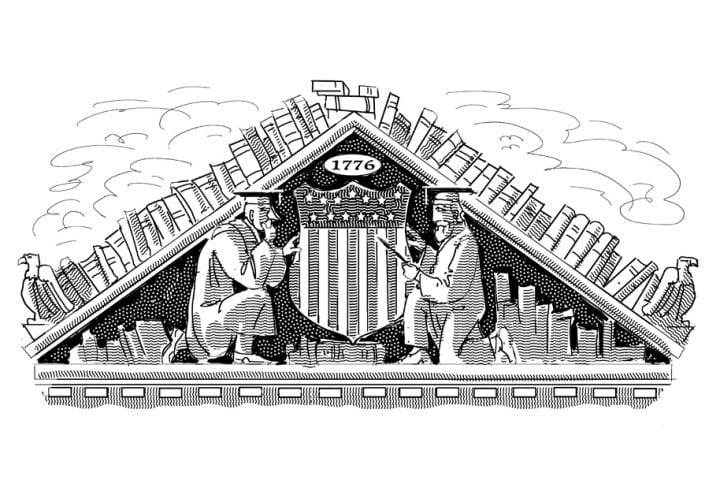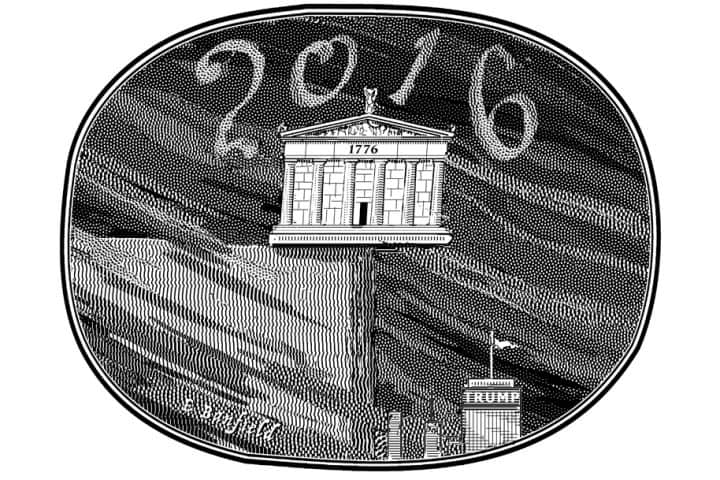Books Reviewed
Russell Amos Kirk was one of the most important conservative writers of the 20th century, and no serious consideration of the birth or trajectory of modern American conservatism would be complete without due regard to his thought. Not simply a popularizer—though he was that—Kirk helped shape the nascent conservative political and intellectual movement in postwar America with the publication of his seminal 1953 book, The Conservative Mind. His alliances with William F. Buckley, Jr., and National Review, and his dalliances with Barry Goldwater’s doomed presidential campaign, helped cement his reputation in the first rank of thinkers who weren’t afraid to come out of the ivory tower and enter the hurly-burly of American public life. From his delightful home—Piety Hill, in Mecosta, Michigan—he and his wife, Annette, hosted countless intellectual and spiritual pilgrims over several decades (and indeed Annette still does). Since his death in 1994, his legacy has been preserved and extended by several scholarly organizations staffed by some of the many people he influenced.
The nature and significance of Kirk’s conservatism remains a vexed question. A bohemian humanist who would become a Catholic, an individualist who would reject libertarianism, a Stoic who would never make peace with his country, a conservative who would oppose not just progressivism but the wasteland of modernity, Kirk was a prolific polymath who would find success as the writer of ghost fiction in addition to history and social and literary criticism. His conservatism was more cultural than political or economic, and he fell decidedly on the traditionalist side of the conservative spectrum, attempting to ground his beliefs in prescription and the wisdom of our ancestors more than in the abstract reason against which he declaimed. He even made time to found and edit a serious review—Modern Age—dedicated to the exposition and preservation of such a conservatism. A believer in eternal truth, he oft-times implied men couldn’t know much about it, other than by something approaching mystical imagery and intuition.
Kirk served stateside in the army in World War II, and his antipathy toward the dehumanization that goes along with big government was solidified by the prosecution of the war at home and abroad, and especially by the dropping of atomic bombs on Japan. This disposition proved to be a harbinger of a broader revulsion against Realpolitik—and politics more generally—that characterized Kirk’s thought for the rest of his life.
* * *
In a splendid, meticulously researched biography, Hillsdale College historian Bradley J. Birzer ably reveals the complexities of Kirk’s thinking. Birzer clearly admires his subject but offers an apologia for his life and work that rarely turns hagiographic. For the most part, Birzer remains even-handed and dispassionate without affecting a false neutrality, though he does occasionally make it difficult to distinguish his own voice from his subject’s.
Tracing formative influences on a person is not easy. It’s difficult enough for each of us to account for himself, and the task of an intellectual biographer is more difficult by orders of magnitude. This is particularly true when the subject is as hard to encapsulate as Russell Kirk. Yet Birzer has done a commendable job of tracing the intellectual influences on Kirk, even though by the end of his long book one can’t see exactly how, or if, they all add up. If one were to quibble with Birzer’s overall approach, the quibble would be that he chose to write a book that is at once thematic, chronological, and personal—sometimes alternately, and sometimes simultaneously. He is thus occasionally prone to repetition, anachronism, and the belaboring of observations—but these are far from the worst of sins for a biographer.
* * *
Given the importance Kirk placed on the patrimony of all things, Birzer wisely spends much time on the provenance of Kirk’s view of the world. He offers mini-biographies of several of the people to whom Kirk was most intellectually and spiritually indebted. The young Kirk was deeply influenced by the literary critics and scholars Irving Babbitt and Paul Elmer More, who were founders of the early 20th-century movement known as the “New Humanism.” From Babbitt he drew the humanist insight that real cultivation of the human prospect must happen at the level of the individual rather than the collective, and that the possibilities for such cultivation are impeded by the West’s rampant consumerism, which creates longings without hope of satisfaction, and separates man from the restraints imposed by custom and the wisdom of the ancients. For Kirk, as for Babbitt, man has a nature, central to which are dangerous appetites that are given free rein by the currents of modernity, including Rousseauean sentimentalism, pragmatism, and egalitarianism.
The modern thinker who most decisively swam against such currents, according to Kirk, was the British statesman Edmund Burke. It was Burke who recognized our connections not only to the living, but to those who preceded us, and to those who would follow. Kirk claimed it was the “faculty of the imagination” that could best give us access to those connections. And it was More who offered Kirk the Christian insight that this faculty was rooted in something other than physical man. Like Babbitt and More, Kirk rejected systematization in thought and politics, seeing it as the mortal enemy of the variegated little truths that dotted the landscape of human experience. Like T.S. Eliot—who was his friend as well as the subject of many of his writings—Kirk had a poetic rather than philosophic sense of “the permanent things” and their enemies. He came to develop Eliot’s sensibility concerning the inextricable link between orthodox Christianity and humanism—for the latter can only wither in conditions of religious fundamentalism or positivism.
* * *
In considering the American situation, Kirk was willing to embrace the “spirit of Jeffersonianism” as a brake on creeping centralization and bureaucratic complexity. But the spirit of Thomas Jefferson was quite different from the systematizing reason of Jefferson, which claimed that all men are created equal, and that the natural consequence of this observable fact of nature is that legitimate government must be of a certain type—namely, republican. Kirk, and many of those who followed in his footsteps, viewed this claim with suspicion, as being too political, too ahistorical, too abstract, too egalitarian, and too universalizing.
Kirk wrote his doctoral dissertation, which would become The Conservative Mind, in the haunted environs of the University of St. Andrews. Always conjuring the ghosts of a never quite dead past, Birzer notes that this American conservative—well into his thirties—had “no real ties to America.” Kirk offered his most comprehensive interpretation of the land of his birth in The Roots of American Order, first published in 1974. There, he presents the American Revolution as a conservative one, originating in the desire to preserve the long-established practices of colonial self-government. In this account, the colonists cared mainly about the rights of Englishmen, as those rights revealed themselves in history. This elides the reality that leading American revolutionaries from Jefferson to John Adams, and later statesmen such as Abraham Lincoln, clearly expressed the view that such rights, while they might be manifested in a particular historical context, inevitably transcend that context because they are self-evident truths of nature and nature’s God, accessible to human reason and applicable to man qua man. Although it is right to say the American Revolution was a conservative one, preserving the best of the English constitutional tradition, it was firmly rooted in this creed, as well as the particularities of culture. For the founders, the American creed meant far more than being created equal in “the social arrangements into which they had been born in America,” as Kirk suggests.
Birzer insists “Kirk never denied the truth of natural rights,” but accepted them as “fundamental realities of the human person.” And yet, he “did not believe that man, alone or in community, had the right or the ability to define them precisely.” For the American Founders, the natural political equality of human beings and the right to consensual government that follows from it were precise enough to guide both the theory and practice of revolutionary politics, and ultimately of constitution-making.
* * *
Kirk’s ideal republic was one of letters, rather than of ordinary striving men. As the political philosopher Leo Strauss intimated, any such republic would embrace all philosophic persuasions, and therefore not take philosophy seriously—it would, of necessity, be relativistic or eccentric. This points to the fact that the prescriptive, intuitive approach to the study of human affairs faces problems both large and intractable. Kirk was quick to denounce ideological simplification and the “ever-imperial grasp” of politics, but for Birzer this means that “a multiplicity of finite individuals would reveal a variety of infinite truths, some seemingly contradictory, others simply incompatible.” One needn’t be an ideologue to claim the meaning of such a formulation is—to put it mildly—unclear. Free government relies on the fact that some things can be known, expressed as a matter of principle, and fixed as a matter of practice. By contrast, Kirk’s “permanent things” always bore an air of mystery. Like socialism, traditionalism takes many evenings, and generates about as many factions. As some early Catholic critics of Kirk maintained, a tradition without a metaphysics is deeply problematic. It easily devolves into a set of competing social conventions.
Beyond such rarified concerns, any Christian humanism must be recognizably human. The fruits of the Enlightenment, including liberation from starvation and disease, would seem to be genuine human goods. The aristocratic leisure that Kirk admired in John Randolph of Roanoke—on whom Kirk wrote one of his books—has in a certain sense been extended by modernity, making it less aristocratic to be sure, but also putting it in the service of a truer and more encompassing Christian humanism. In the terms of the American Founders, the truth of equal natural rights, which possesses an inherent political salience, is ultimately more useful, and Christian, than its main competitors. It also serves to check the very state that Kirk rightly suggested is the enemy of those “ancient institutions” that serve as the guardians of true community.
One must be circumspect in rebuking a master for his students, but ideas have consequences, and it’s worth noting that some of those influenced by Kirk present themselves as deeply unpatriotic. They are quick to place blame for moral and political evil at the foot of ideological nationalism, in the form of an American Leviathan. But this insistence on seeing Enlightenment philosophy and the Reformation as the roots of all evil can itself become a species of ideology: assigning such blame fails to recognize that prudent statesmen deal not simply or primarily in ideology, but in necessity—a calculus that long predates the Enlightenment, and which can often force less than ideal, but not necessarily bad, policy choices. A statesman must view each situation not as a historian, but as a political actor—something our ancestors knew well. And one might add to this the observation of George Orwell, a man who understood the 20th century as well as anyone who ever lived it: civilization often depends on its opposite. The relatively uncivilized feed, guard, and commit violence on behalf of those who thereby have the luxury of abjuring such necessities.
* * *
Ultimately, a distinctively American conservatism cannot simply reject the nostrums of modernity without also seeing the truths that it made plain, and the necessities that do not change with time. And indeed, systematization and universalism are required even for the Christian humanism that Kirk rightly argued must be part of any American conservatism. One only has to repeat the Nicene Creed, or reflect on Paul’s admonition to Peter not to draw back from the Gentiles, to know this.
Notwithstanding these reservations, Bradley Birzer’s book serves as a salutary reminder that the good and the ancestral, the universal and the particular, the absolute and the bounded, nature and history, reason and veneration, are all matters with which American conservatives rightly wrestle, and they couldn’t wrestle with them rightly in the absence of Russell Kirk. It also reminds us that Kirk offers much that might hearten contemporary conservatives of any persuasion—including the requirement of Stoic determination in the face of long odds. Birzer reports Kirk’s state of mind when he resigned a secure academic post in the early 1950s: “time to think, and freedom of action” are more important than economic advantage, and one must make one’s own way, “opposed rather than aided by the times and the men who run matters for us.” Permanent things indeed.




